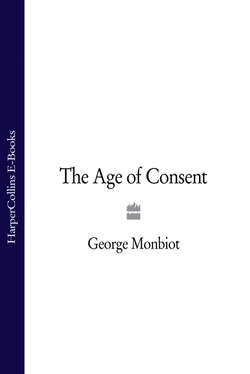Читать книгу The Age of Consent - George Monbiot - Страница 5
PROLOGUE Some Repulsive Proposals
ОглавлениеEverything has been globalized except our consent. Democracy alone has been confined to the nation state. It stands at the national border, suitcase in hand, without a passport.
A handful of men in the richest nations use the global powers they have assumed to tell the rest of the world how to live. This book is an attempt to describe a world run on the principle by which those powerful men claim to govern: the principle of democracy. It is an attempt to replace our Age of Coercion with an Age of Consent.
I present in this manifesto a series of repulsive proposals, which will horrify all right-thinking people. Many of them, at first sight or in conception, horrified me. I have sought to discover the means of introducing a new world order, in which the world’s institutions are run by and for their people. Their discovery has obliged me first to re-examine the issues with which I have, for some years, been struggling. This process has forced me to recognize that some of the positions I have taken in the past have been wrong. It has brought me to see that the vast and messy coalition to which I belong, which is now widely known as the ‘Global Justice Movement’,* has misdiagnosed some aspects of the disease and, as a result, offered the wrong prescriptions.
In searching for the necessary conditions for an Age of Consent, I have not sought to be original. Where effective solutions have already been devised, I have adopted them, though in most cases I have felt the need to revise and develop the argument. Some of the policies I have chosen have a heritage of three thousand years. But where all the existing proposals appear to me to be inadequate, I have had to contrive new approaches. My principal innovation, I believe, has been to discover some of their synergistic effects and to start to devise what I hope is a coherent, self-reinforcing system, each of whose elements – political and economic – defends and enhances the others.
I have sought to suggest nothing that cannot be achieved with our own resources, starting from our current circumstances. Too many of the schemes some members of this movement have put forward appear to be designed for implementation by the people of another time or another planet. This is not to suggest that any of the transformations I propose will be easy. Any change worth fighting for will be hard to achieve; indeed if the struggle in which you are engaged is not difficult, you may be confident that it is not worthwhile, for you can be assured by that measure that those from whom you need to wrest power are not threatened by your efforts. We will know that our approach is working only when it is violently opposed.
Nor do I presume to suggest anything resembling a final or definitive world order. On the contrary, I hope that other people will refine, transform, and, if necessary, overthrow my proposals in favour of better ones. I have attempted to design a system which permits, indeed encourages, its own improvement, and mobilizes the collective genius unleashed whenever freely thinking people discuss an issue without constraint. And these proposals are, of course, a means to an end. If they fail to deliver global justice, they must be torn down and trampled, like so many failed proposals before them.
I will not explain them here, as this will encourage some readers to imagine that they have understood them and have no need to read on. I think it is fair to say that they and their implications cannot be understood in essence unless they are also understood in detail. The four principal projects are these: a democratically elected world parliament; a democratised United Nations General assembly, which captures the powers now vested in the Security Council; an International Clearing Union, which automatically discharges trade deficits and prevents the accumulation of debt; a Fair Trade Organization, which restrains the rich while emancipating the poor.
I have, I hope, made no proposal that depends for its success on the goodwill of the world’s most powerful governments and institutions. Power is never surrendered voluntarily; if we want it, we must seize it. Because, for obvious reasons, the existing powers can be expected to resist such changes, they must be either bypassed or forced to comply. I believe, as the subsequent chapters will show, that I have discovered some cruel and unusual methods of destroying their resistance.
I ask just one thing of you – that you do not reject these proposals until you have better ones with which to replace them. It has been too easy for both our movement and its critics to dismiss the prescriptions they find disagreeable without proposing workable measures of their own, thereby preventing the possibility of radical change. If you believe that slogans are a substitute for policies, or that if we all just love each other more, there’ll be a transformation of consciousness and no one will ever oppress other people again, then I am wasting your time, and so are you.
